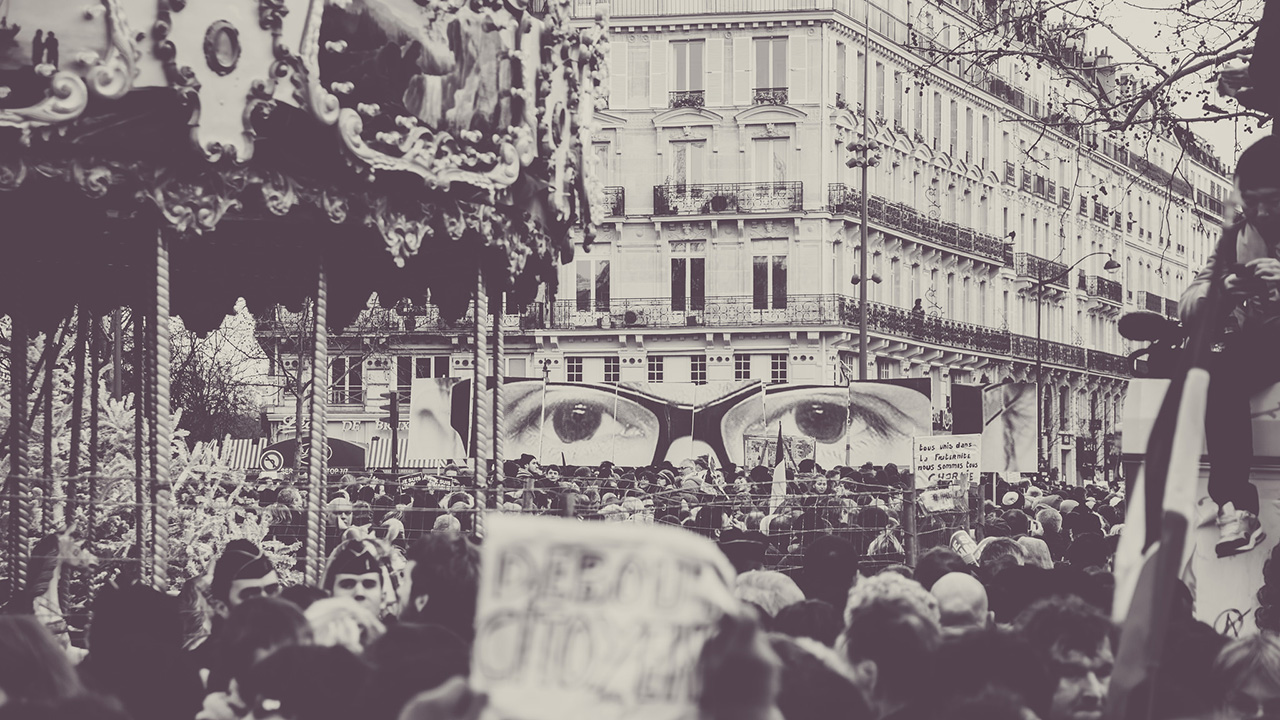In part of what French officials say is the nation’s largest turnout on record nationwide, an estimated 1.5 million people took to the streets in Paris on Sunday to show solidarity with satirical French weekly Charlie Hebdo and the victims of subsequent terrorist attacks that killed 17 people last week. More than 40 world leaders joined the unprecedented turnout, marching in silence to take a public stand against terrorism and to support freedom of speech.
On Wednesday, two gunmen suspected to have jihadist ties opened fire at the offices of Charlie Hebdo — an organization that has a history of ridiculing religion, including Islam — killing four cartoonists and eight others. Amid the outpouring of support for Charlie Hebdo after the tragedy, many have come to see the massacre as an attack on freedom of speech. But that claim has sparked a debate among scholars, cartoonists, and journalists about whether there are double standards when it comes to the type of “free speech” that the West tolerates.
In a similar vein, Reporters Without Borders, the France-based nonprofit that defends freedom of speech and freedom of the press internationally, has called out several world leaders for marching despite maintaining abysmal freedom of press records on home soil. In a statement translated into English via the Guardian, RWB said:
We should show solidarity with Charlie Hebdo without forgetting the world’s other ‘Charlies’,” said Christophe Deloire, secretary general of the campaign group. “It would be intolerable [if] representatives from countries that reduce their journalists to silence profit from this emotional outpouring to … improve their international image … We should not allow the predators of the press to spit on the graves of Charlie Hebdo.
Some countries, like Egypt and Russia, have jailed journalists for being critical of the government. Turkey is currently prosecuting 70 journalists for looking into government corruption. Based on RWB’s 2014 index of 180 nations, almost half of the countries represented in the Unity March have “noticeable problems” and “difficult situations” regarding freedom of speech — if using a grading system, those would be C or D, respectively. To see where countries present at the Unity March really stand on issues related to freedom of expression, ANIMAL looked up their index rating on RWB. Check out our comprehensive ranking below:
1. Finland, Rank: #1

Prime Minister Alexander Stubb
2. Netherlands, Rank: #2

Prime Minister Mark Rutte
3. Norway, Rank: #3

Prime Minister Erna Solberg
4. Luxembourg, Rank: #4

Prime Minister Xavier Bettel
5. Denmark, Rank: #7

Prime Minister Helle Thorning-Schmidt
6. Sweden, Rank: #10

Prime Minister Stefan Lofven
7. Austria, Rank: #12

Foreign Minister Sebastian Kurz
8. Czech Republic, Rank: #13

Prime Minister Bohuslav Sobotka
9. Germany, Rank: #14

German Chancellor Angela Merkel
10. Switzerland, Rank: #15

President Simonetta Sommaruga
11. Ireland, Rank: #16

Prime Minister Enda Kenny
12. Canada, Rank: #18

Public Safety Minister Steven Blaney
13. Poland, Rank: #19

Prime Minister Ewa Kopacz
14. Slovakia, Rank: #20

Prime Minister Robert Fico
15. Belgium, Rank: #23

Prime Minister Charles Michel
16. Portugal, Rank: #30

Prime Minister Pedro Passos Coelho
17. UK, Rank: #33

Prime Minister David Cameron
18. Slovenia, Rank: #34

Prime Minister Miro Cerar
19. Spain, Rank: #35

Prime Minister Mariano Rajoy
20. Latvia, Rank: #37

Prime Minister Laimdota Straujuma
21. France, Rank: #39

President Francois Hollande
22. Romania, Rank: #45

President Klaus Iohannis
23. US, Rank: #46

France Ambassador Jane Hartley
24. Niger, Rank: #48

President Mahamadou Issoufou
25. Italy, Rank: #49

Prime Minister Matteo Renzi
26. Malta, Rank: #51

Prime Minister Joseph Muscat
27. Hungary, Rank: #64

Prime Minister Viktor Orban
28. Croatia, Rank: #65

Prime Minister Zoran Milanovic
29. Benin, Rank: #75

President Thomas Boni Yayi
30. Kosovo, Rank: #80

President Atifete Jahjaga
31. Georgia, Rank: #84

Prime Minister Irakli Garibachvili
32. Albania, Rank: #85

Prime Minister Edi Rama
33. Israel, Rank: #96

Prime Minister Benjamin Netanyahu
34. Gabon, Rank: #98

President Ali Bongo
35. Greece, Rank: #99

Prime Minister Antonis Samaras
36. Bulgaria, Rank: #100

Prime Minister Boiko Borissov
37. Qatar, Rank: #113

Sheikh Mohamed Ben Hamad Ben Khalifa Al Thani
38. United Arab Emirates, Rank: #118

Foreign Minister Sheikh Abdullah bin Zayed al-Nahayan
39. Algeria, Rank: #121

Foreign Minister Ramtane Lamamra
40. Mali, Rank: #122

President Ibrahim Boubacar Keita
41. Ukraine, Rank: #127

President Petro Poroshenko
42. Tunisia, Rank: #133

Prime Minister Mehdi Jomaa
43. Palestine, Rank: #138

Authority President Mahmud Abbas
44. Jordan, Rank: #141

King Abdullah II and Queen Rania
45. Russia, Rank: #148

Foreign Minister Sergei Lavrov
46. Turkey, Rank: #154

Prime Minister Ahmet Davutoglu
47. Bahrain, Rank: #163

Foreign Minister Sheikh Khaled ben Ahmed Al Khalifa and Prince Abdullah Ben Hamad al-Khalifa
(Photo: Adrien Fauth)



